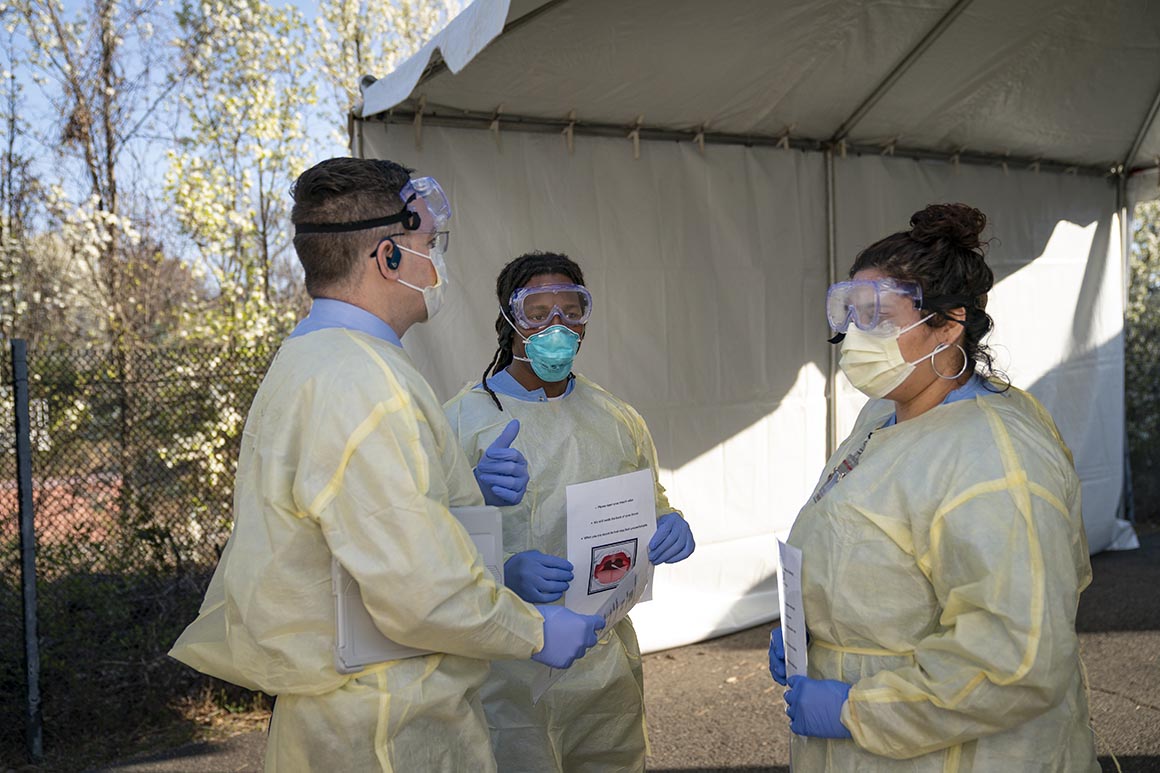
Lucas told POLITICO that hospital cleaning staff have been directed to clean rooms that held coronavirus patients without a mask in order to conserve them for medical providers. Even with new data showing the virus can survive on surfaces for hours, the unprotected cleaners are expected to turn over the rooms for new patients much more quickly.
As of Thursday afternoon, hundreds of thousands of health care workers had signed an online petition demanding the government do more to ensure an adequate supply of masks and other protective equipment.
Yet federal aid has been slow to arrive.
On Wednesday, the Trump administration invoked the Defense Production Act to ramp up production of desperately needed hospital equipment. Though the White House had discussed taking this step for weeks, it has not yet done the required assessment of what supplies are most in need, meaning those items may take months to actually make it to the front lines. Trump also indicated he was in no hurry to move forward, tweeting this week that he only signed the act “should we need to invoke it in a worst case scenario in the future.”
Many states say that “worst case scenario” has arrived.
On Thursday, Massachusetts lawmakers wrote to the Trump administration saying they had only received 10 percent of the 750,000 masks and other equipment they requested weeks ago, and warned that the state’s hospitals are „facing or are imminently anticipating shortages.“
The office of Washington Gov. Jay Inslee, whose state has more than 900 confirmed cases, said Thursday there are still „substantial shortages“ of protective gear despite two shipments from the Strategic National Stockpile. Inslee’s office said the federal government hasn’t filled the state’s most recent request for tens of thousands of additional N-95 respirators, surgical masks and face shields.
The stockpile of medical equipment, originally designed for use during a nuclear disaster or biological attack, was never intended to last during a prolonged pandemic.
Officials in Ohio say what they‘ve received from the stockpile falls far short of hospitals’ needs.
“Ohio has received our full allocation from the national strategic stockpile,” Tamara McBride, the chief of the Bureau of Health Preparedness at the Ohio Department of Health, told reporters earlier this week. “If we do not take conservation steps now, we will not have health care workers that are protected to care for the most sick.”
Like other states, Ohio’s leaders have asked veterinarians and dentists to donate masks and other materials to hospitals. They have also asked food service workers to donate latex gloves. A hospital in Atlanta has even had to rely on a donation of masks, gloves, and gowns from a TV medical drama being filmed nearby.
Pence lavished praise Thursday on the construction industry for responding to the federal government’s call to donate masks, but did not say how many have been obtained that way. And as recently as Tuesday, the Association of General Contractors said the administration had not consulted with it about this request, and the group worried that the loss of masks would put their own workers at risk.
„Without those masks, they would be immediately out of work, because they can‘t work without masks,“ said Vice President of Public Affairs Brian Turmail.
AGC added Thursday that HHS had asked the group to send an inventory of all their members’ available safety equipment, including masks and protective suits, but no donations have yet been made. „We are going to ask our chapters tomorrow morning to collect this information and share it with HHS,” Turmail said.
In the meantime, all sectors of the medical community are doing whatever they can to conserve masks. Medical students, for example, have halted their clinical rotations, and hospitals have suspended elective procedures.
Janis Orlowski, chief health care officer at the Association of American Medical Colleges, told reporters on a call Thursday that the lack of masks and other personal protective equipment remains the “number one issue” she’s hearing from teaching hospitals battling coronavirus.
“Are we worried about this? Yes, we are,” she said. “We are really going to have to push to get more PPE into the hands of our health care workers.”
Gavin Bade contributed reporting.
Source: politico.com
See more here: news365.stream






